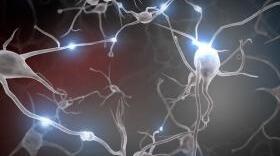Around this time of year, we all try to do some spring cleaning.
Well, it turns out that your brain does some of that too.
Jun-Lin Guan, Ph.D, is a researcher at the University of Michigan and is the senior author of a new article that explained the importance of an important protein that helps our brains clean and maintain stem cells that reside deep in the brain.
The paper identifies the FIP200 protein as one that plays a crucial role in autophagy - a "cellular self-cleaning process that is important to neural stem cells."
Guan's team identified the protein in neural stem cells in mice. Without this specific type of protein, stem cells aren't able to morph into other types of cells to repair your brain.
These reserve stem cells exist solely for the purpose of being ready to help. Basically, they can turn into whatever type of nerve cell your body needs as it ages and undergoes change.
A piece from the University of Michigan Health System explained:
It is the first time that this cellular self-cleaning process, called autophagy, has been shown to be important to neural stem cells. The findings may help explain why aging brains and nervous systems are more prone to disease or permanent damage, as a slowing rate of self-cleaning autophagy hampers the body's ability to deploy stem cells to replace damaged or diseased cells. If the findings translate from mice to humans, the research could open up new avenues to prevention or treatment of neurological conditions.
The study could be used as evidence that aging brains have a harder time replenishing and renewing brain cells - as you age, your brain slows down, too.
Autophagy cleans out unneeded material within cells, and when that process slows down, so does our ability to maintain the health of stem cells in the brain.
In a related review article just published online in the Journal Autophagy, the lead U-M scientist and colleagues from around the world discuss the growing evidence that autophagy is crucial to many types of tissue stem cells and embryonic stem cells as well as cancer stem cells. As stem cell-based treatments continue to develop, the authors say, it will be increasingly important to understand the role of autophagy in preserving stem cells' health and ability to become different types of cells.
If researchers can figure out how to maintain the rates of autophagy in aging brains, we might be able to preserve and extend our neurological health.
- Lucy Perkins, Michigan Radio Newsroom





